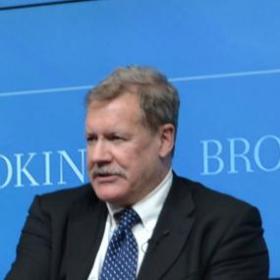
A Role for the Private Sector in Somalia?
'Somalia enfeebled by hunger, still exports food'
That headline above appeared in the New York Times in September 1981. Thirty years later, we are seeing the same problem.
According to IDN, livestock exports from Somalia continue unabated since the outbreak of famine in the country in April this year. Somalia is actually a number of pocket economies, not as well connected to each other as some are to the outside world. The north (Somaliland) is less threatened by conflict and more prosperous than the south, where the majority of the hunger-stricken refugees find themselves.
In fact, Somaliland is a highly autonomous region that declared itself independent from Somalia in 1991 and has its own rather small and lightly-armed military forces. So even if there were transport routes to get food from the north to the south and if the people there could afford to buy it, the Somaliland authorities may feel no special interest in helping them out.
Somaliland is treading a fine political line between an international community that refuses to recognize it and the radical forces in Somalia, especially Al Shabaab, that are continually trying to infiltrate, subvert and threaten the northern republic. Yet, as its Foreign Minister Mohamed Omar has observed this past week, “non-recognition has not prevented the steady improvement of relations with our neighbours and other international partners.”
Omar made a powerful point. He said that recognizing and stabilising Somaliland could be part of a process of bottom-up stabilisation of Somalia to which, he says, Somaliland acceded in 1960. He said that there could be no international plan for Somalia that would succeed. That may be so, and his approach definitely seems worth considering, but one wonders what the total package of stabilization would like.
Omar did extend his sympathy to the suffering people of the rest of Somalia this week, but the Republic of Somaliland barely has the capacity to help itself let alone help in the rebuilding of the other Somalia. The political status of Somaliland will be an important reference point for the international community going forward as it rises to meet its obligation to return order and security to the failing state of Somalia. The incursion by Kenyan troops into southern Somalia this past week, in effect supporting the African Union forces already restoring order in Mogadishu, the capital, may buttress the security foundations needed for a return to order.
Yet the international community needs a bigger vision, both in moral or emotional terms and in political and economic terms. Somalia, with an area bigger than France or Spain, is a country of huge potential. It has the biggest coastline of any country in Africa. According to the European Commission, some estimates suggest fisheries production from Somali waters “should reach annually 200,000 tonnes, around 10 times the current yield”. It also reports that offshore fishing by foreign and Somali interests “has all but ceased operations in the current climate”.
An emergency meeting of international organizations in August 2011, convened to address the food crisis in Somalia, called for a comprehensive set of responses to the root causes, including long term sustainability options. One of the many measures suggested was “identifying viable and acceptable alternatives to pastoral livelihoods”, while significantly strengthening the resilience of pastoralism.
But Somalia needs some political champions in the international community to fight for these ideas and to direct the new support needed. Someone has to fill what the FAO Director General, Jacques Diouf, called the “funding gaps”. New investment is needed, as Diouf observed, but we may need a more private sector orientation than his formula of “government endorsed investment plans”. Can we, and should we, unleash the private sector, both local and international to be the international champions of a resurgent Somalia?

